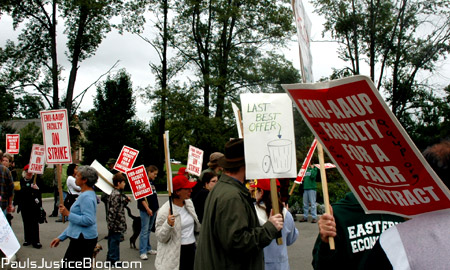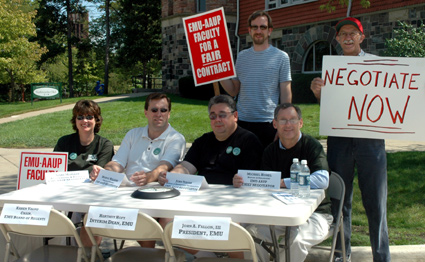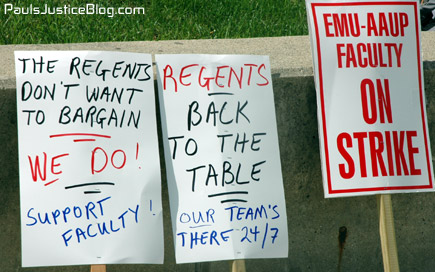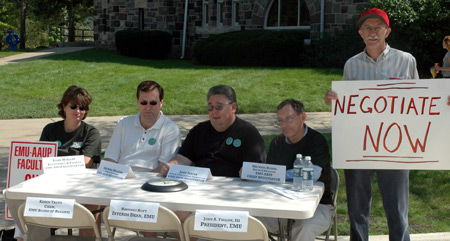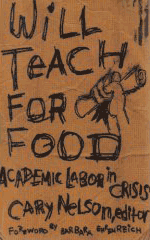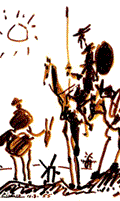On Strike for Labor Day (Part 13)
I've been busy in my role heading the union's communications efforts and thinking about a post similar to what my colleague Steve Krause did on blogging about the strike (the "blogging about blogging (or metapost)". But I came across the 'public diary' of EMU's president and was struck by how in the 14 days he covered there was no mention of the strike. Yes, 600+ faculty go on strike, students demonstrate, administrators dissented and NOT WORD ONE ABOUT ANY OF IT; you wouldn't even know that there was any unrest.
Maybe this isn't surprising if you view such efforts as unvarnished PR, but this was done at the request of the Journal of College and Character, which requested a number of college presidents to keep public diaries. You'd think that for a journal about "moral and civil learning in higher education" a strike and labor strife would be something to mention? Wouldn't it be a platform to show off your own leadership and values in a time of turmoil? (Assuming you believed you did the right thing and showed some leadership...)
So let's set this up and review what's in his diary.
On Sept 1, the faculty went on strike when the contract expired because the offer on the table was basically 2% a year for 5 years with a 2-3% health care giveback. The President and Chair of the Regents wrote us a letter saying that they would walk out of talks on Sept 5 at 10pm if we did not have a contract and we were still on strike. They walked out, and when classes began the next morning at 8am, faculty were on strike, there were no negotiations to resolve the strike; there were no negotiations on returning to negotiate.
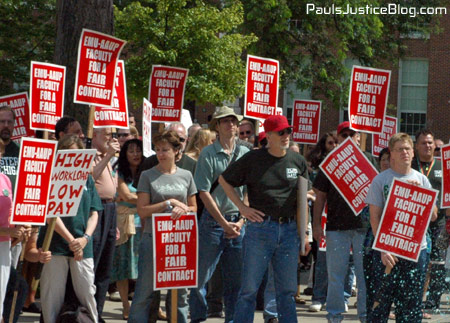
See earlier parts of On Strike for Labor Day for more information and pictures
So what's in Fallon's first diary entry?
The beginning of the academic year represents an opportunity to begin anew. As of early this morning, not one single person had failed at anything or so much as missed a deadline. All of our institutional systems, meters, and gauges have been recalibrated and set to zero. We all begin with a clean slate. It is the single point in the academic year when everything – absolutely everything – is good. I am mindful that ours may well be the only sector of society that affords such an opportunity.
I'd say it's best characterized as insipid drivel. You can read the rest, but I can assure you there's no mention of the strike as he talks about his weekend activities, just more of the same lame rhetoric we've heard for the last year about removing the rear-view mirror to have a better vision of the future (something which greatly annoys the historians probably more the rest of us).
On Friday, still no negotiations and there are an increasing number of students in front of the administration building. The students are chanting for 30 to 45 minutes at a time, multiple times a day, for the administration to negotiate with us. They're loud and pumped up and they can be clearly heard inside the building. They even marched through the lobby once, although the rest of the time they stayed outside and collected 1,200 signatures in two days for the administration to return to talks.
So what's in Fallon's second diary entry?
During these meetings [with the community] I spent most of my time talking about leadership principles and perspectives that are important to me rather than bold new initiatives. Principles like a strong and unwavering commitment to honesty, ethics and integrity; openness; the importance of active followership; accountability; and my abhorrence of the status quo. It has been my experience that these principles, and their implementation, give rise to substantive directions, initiatives and programs. Indeed, they represent both outcomes and strategies simultaneously.
I also spent time discussing with them my own personal values. In the same way that principles and perspectives give rise to institutional initiatives, behavior – leadership behavior – derives from personal values. Values like an abhorrence of pretense and arrogance; a full embrace of diversity; trust; and respectful listening as the most important, and most elusive, element of human communication. A colleague has a plaque on her wall that says, and I’m liberally paraphrasing, “Watch your thoughts because they become your words. Watch your words because they become your actions. Watch your actions because they become your character. And character is who you are.” I’ve come to understand the importance of values over time and increasingly look for evidence of them in others.
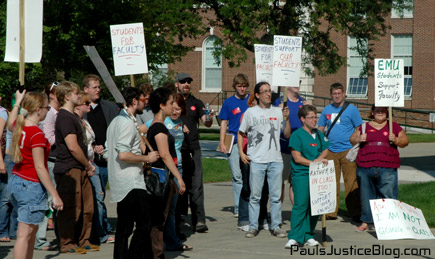
See On Strike for Labor Day Part 9 for more information
No mention of the students or the strike. But I'd love to know how leadership, integrity, openness, trust and respectful listening played out here. Seems to me like he walked out of a conversation about the contract and ignored the students without an explanation. Are there interpretations of those values I'm missing, or has his character changed without him being aware that his words and thoughts have changed? [Seriously, I'd like to know; I'll even post a response here Pres Fallon.]
On Sunday, after 10 days of being on strike, faculty showed up on mass to picket in front of the President's house. There were 125 there at it's peak, and more than 150 faculty showed up over the several hours we were there. You'd think that when compliance with the strike is high and almost 25% of the faculty personally show up on a Sunday afternoon to picket you, that would be worth a mention?
click for a larger version. See On Strike for Labor Day Part 12 for more discussion of the picketing
So what's in Fallon's fourth entry?
God knows I love football – not just the game itself, but the bands, the pageantry, the fans and, most assuredly, the hot dogs.
~ snip ~
On the same day our team kicks off its home season, preceded and followed by all manner of social activities, my youngest son’s collegiate team does the same, albeit five hours away. This appears to be a “no-win” proposition. It’s the sort of issue for which there is no fully acceptable tact. The choice of which game to attend is agonizing and does not lend itself to facts and figures and other forms of hard support. No, the choice exists in the province of softer but no less important things … like values and principles and instinctive priorities. In the main, it represents a head-on collision between professional obligations and responsibilities and personal commitment, support and human love. It’s a choice that must be made with the heart, not the mind. No doubt there will be detractors either way.
|
|
|
While I'm not unsymathetic to the problem, if he's going to talk about "good feeling comes from making a difficult decision based upon conviction and principle" I'd be interested in hearing a little about the mental process of sticking by his decision to not negotiate with faculty. We know there was a great deal of dissent among administrators, and one story from multiple well-placed sources has it that Fallon wanted an Associate Dean fired for insubordination because of his comments and refusal to go along with some aspects of the administration's plan for handling the strike. There's a good entry for a public diary. (Or at least explain how "putting family first" and working "toward a family-friendly community" realtes to dealing with faculty and our contractual concerns.)
To understand Fallon's public diary, simply look at his Personal Perspectives and Values page, then think of a story that can be told in a few paragraphs that supposedly captures that value in a trite and superficial way. And that's what bothers me - not his values, but that he had the opportunity to really show how they applied during a time of crisis that required leadership. And he didn't. Or maybe he couldn't?
I have no problem with much of what he lists as a personal value: abhoring human superiority; believing in unconditional acceptance; the importance of interpersonal trust; being family-friendly; believing in the preeminence of ethics, honesty and integrity; the importance of listening; and the belief that people's basic nature requires and deserves unrelenting respect.
I just don't see any of these values operating in his actions by way of the strike, nor do I seem in his decision to write a public diary that was silent on an enormous amount of unrest and strife that was occuring partly because of his decisions and his "leadership". An honest public diary about the stike would have been far more valuable to readers of the journal and would give faculty some insight into the university president that we're still missing.
So, I disagree with his substantive decisions about the strike, and about his decision not to talk about his decisions in an excercise for a journal on character. But I'm willing to listen. Anytime....




